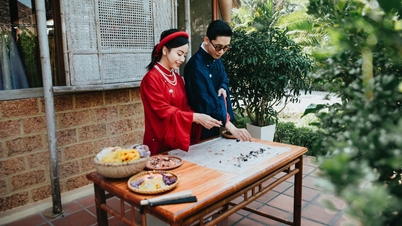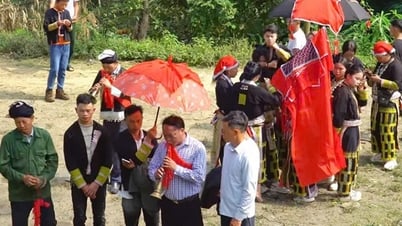
Illustration: cuoi.tuoitre.vn
The recent story of some parents giving their children huge dowries on their wedding day has sparked many opinions from readers.
Most recently, the news that the vice chairman of Giang Thanh district, Kien Giang province, gave his daughter 600 hectares of land (equivalent to 90 billion VND) on her wedding day caused a stir in public opinion. However, the vice chairman of this district said that his wife had misspoken.
In Vietnamese culture, giving dowries to the bride and gifts to the groom often takes place, depending on the conditions of each family.
But how to give reasonably, how to give so that everyone sympathizes without bothering the giver, the receiver and public opinion, that is something worth discussing.
To add another perspective, the following is an article sent to Tuoi Tre Online by reader Nguyen Vu Moc Thieng.
It is not what you give but the way you give.
Vietnamese tradition considers marriage as one of the three important events in a person’s life. They are “Buying a buffalo – Getting married (including getting married) – Building a house”.
Therefore, when marrying off their daughters, most Vietnamese families give them a dowry.
Giving a dowry to the bride and gifts to the groom shows the respect of family and relatives for their children and grandchildren, along with blessings for the new family.
But giving as a way of showing off in some cases of "showing off" that public opinion has mentioned, what will the receiver and the giver get besides unnecessary trouble?
And are such ostentatious weddings happier and more lasting than simple, modest, and cozy weddings?
I have seen some young people from well-off families have simple weddings, with only the two families and close friends. The rest are just “wedding announcement” cards because they don’t want to “owe each other”.
On the other hand, showing off wealth and giving children too much dowry in weddings will affect their will to be independent, encourage a pragmatic lifestyle, and discriminate between rich and poor.
Show-offs and vulgarity can encroach on traditional moral values.
If you want to give money to help your daughter or son-in-law start a business, there are many ways to do it, it doesn't have to happen at the wedding, engagement ceremony and "announced" in front of the public.
The Vietnamese have a very good proverb: "The way you give is better than what you give."
Young people sitting on a pile of money, how can they understand the value of money?
I have quite a few foreign friends who were invited to attend weddings in Vietnam, witnessed the lavish parties, and then the parents of both sides came to give "huge" dowries.
Some people have asked: "Is it because Vietnamese weddings are too complicated and expensive that Vietnamese people rarely dare to divorce?"
Having traveled to many places and attended many weddings of Western friends, I learned that their good point is to organize them very simply but solemnly.
In particular, many Western youth value independence as a core value and strongly dislike relying on their parents.
On the contrary, for parents, no matter how much they love their children, there is no need to show off dowry at weddings like in Vietnam.
They think that just starting a family and already sitting on a pile of money, how can they understand the value of money, let alone the ability to manage and inherit the business.
Must know "save food for emergencies"
My husband and I organized our children's weddings. Apart from the traditional required items, we tried to provide enough for them so they wouldn't feel lonely. But on the wedding day, we didn't give or promise anything.
When our children graduated from college and started working, we talked to them that if they wanted to get married, they would move out and live on their own, and not live with their parents. If they didn’t have their own house, they would rent a house and live together.
Even though we have land and house, we will give them to our children someday.
My children knew their place, so they worked, saved, and bought land to build a house before getting married. Their in-laws knew, but they didn’t dare say anything. If they did, they would just say, “They’re stingy.”
We force our children to be responsible for themselves. They must know how to work and be independent. They must know how to save for emergencies.
A son who is better than his father is a blessing to the family. No matter how rich the parents are, if the children have no will, they will eat mountains. We do not need anyone's praise, nor are we afraid of anyone's criticism.
Reader account thie****@gmail.com
































































































Comment (0)